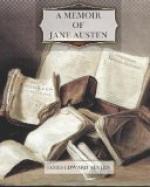Captain Wentworth had taken care to meet the Admiral as he returned into the house, to satisfy him as to Mr. Elliot and Kellynch; and the delicacy of the Admiral’s good-nature kept him from saying another word on the subject to Anne. He was quite concerned lest he might have been giving her pain by touching on a tender part—who could say? She might be liking her cousin better than he liked her; and, upon recollection, if they had been to marry at all, why should they have waited so long? When the evening closed, it is probable that the Admiral received some new ideas from his wife, whose particularly friendly manner in parting with her gave Anne the gratifying persuasion of her seeing and approving. It had been such a day to Anne; the hours which had passed since her leaving Camden Place had done so much! She was almost bewildered—almost too happy in looking back. It was necessary to sit up half the night, and lie awake the remainder, to comprehend with composure her present state, and pay for the overplus of bliss by headache and fatigue.
* * * * *
Then follows Chapter XI., i.e. XII. in the published book and at the end is written—
Finis, July 18, 1816.
CHAPTER XIII.
The Last Work.
Jane Austen was taken from us: how much unexhausted talent perished with her, how largely she might yet have contributed to the entertainment of her readers, if her life had been prolonged, cannot be known; but it is certain that the mine at which she had so long laboured was not worked out, and that she was still diligently employed in collecting fresh materials from it. ‘Persuasion’ had been finished in August 1816; some time was probably given to correcting it for the press; but on the 27th of the following January, according to the date on her own manuscript, she began a new novel, and worked at it up to the 17th of March. The chief part of this manuscript is written in her usual firm and neat hand, but some of the latter pages seem to have been first traced in pencil, probably when she was too weak to sit long at her desk, and written over in ink afterwards. The quantity produced does not indicate any decline of power or industry, for in those seven weeks twelve chapters had been completed. It is more difficult to judge of the quality of a work so little advanced. It had received no name; there was scarcely any indication what the course of the story was to be, nor was any heroine yet perceptible, who, like Fanny Price, or Anne Elliot, might draw round her the sympathies of the reader. Such an unfinished fragment cannot be presented to the public; but I am persuaded that some of Jane Austen’s admirers will be glad to learn something about the latest creations which were forming themselves in her mind; and therefore, as some of the principal characters were already sketched in with a vigorous hand, I will try to give an idea of them, illustrated by extracts from the work.




